UCL Medawar Gardens - a student-led Wild Bloomsbury initiative
Medawar Gardens is a UCL students-led project that aims to bring more nature and greenery into the heart of UCL’s campus, in the middle of London.
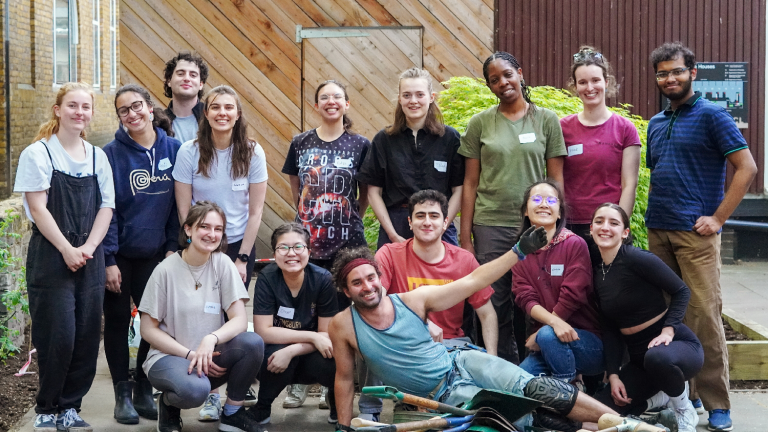
20 May 2022
Medawar Gardens was made possible through the support from both Sustainable UCL, UCL Estates and UCL’s Gardening contractor Tivoli as well as the wide participation of UCL students and staff in the gardening sessions. This blog is written by student Wild Bloomsbury Ambassador: Aude Vuilliomenet.
Project Background
Medawar Gardens is a hidden jewel at the heart of UCL campus. The garden is protected from the busy campus streets, the wind that sweeps through Malet Place, and the noise of the cars on Torrington Place and Gordon Square. Large and elegant plane trees cover Medawar Gardens, providing shade to cool the space in the summer. Medawar Gardens has a unique atmosphere: it welcomes tranquillity, encourages exploration, and invites us to take a break.

Medawar Gardens— Before Gardening Sessions. Images Credit: Aude Vuilliomenet
It was November 2021, Arun, Sarah and I had just been selected as Wild Bloomsbury Ambassadors, a Sustainable UCL initiative, and were thinking about our roles and how we could contribute. How could we invite people to engage with nature? How could we raise people’s environmental awareness? What could be some of our first actions? Needless to say, we were excited. Three points stood out in our discussions:
- Give opportunities to learn about the restoration and creation of green infrastructure.
- Create a sense of ownership over some of the UCL campus outdoor spaces.
- Encourage collaborations and strengthen relationships between Sustainable UCL, UCL Estate, as well as UCL students, academics, and staff.
The garden directly attracted our attention. Medawar Gardens was the perfect spot to achieve our aims and to contribute to UCL's Sustainability Strategy: Change Possible which commits UCL to create 10,000m2 of additional biodiverse space by 2024 in the 'Wild Bloomsbury Campaign'. Adding nature and creating a healthier and livelier environment would ultimately support the health and wellbeing of students and staff, while also building climate resiliency by reducing flood risks, improving air quality, or mitigating heat waves. Medawar Gardens presented itself as an opportunity to generate momentum behind the initiative.
The rewilding of Medawar Gardens would provide an aesthetically pleasing, sensory stimulating, and environmentally sound garden. It would serve to demonstrate how sustainably balanced plants and insect populations support the flourishing of a self-sustaining habitat. To accomplish this, we worked with Sustainable UCL and UCL Estates to ensure the project fits in line with their campus improvements programme. UCL’s gardeners, Stan, Jamie, and Jason, from Tivoli Group, also provided their generous support by helping us to get the right gardening tools and having a nice selection of plants. We also planned gardening sessions and recruited volunteers to help us accomplish the work. After some back-and-forth discussions, it was time to get started!
Project Steps
Gardening is not only about planting. It requires preparation but also quite a bit of thinking. It is a great activity that combines physical work, design, and patience. Over the course of four afternoons, student volunteers joined the gardening sessions to reshape Medawar Gardens.
Day 1 — Clearing
The aim for the first afternoon of work was to clear and prepare the site for future work. A group of students started to work around the maple tree, removing the numerous flat and thin pieces of dark grey stone and pulling up the weed blocker lying underneath them. Another group concentrated on cutting and digging up unwanted and unhealthy plants around the pergola bed. It was quite magical to see the determination of everyone in clearing up the space and the enthusiasm for creating something new!
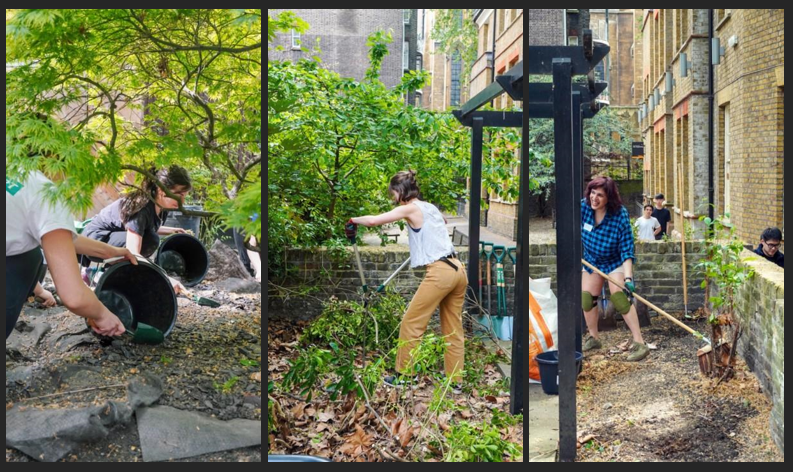
(1) Holly and Dow are removing the small pieces of slate. (2) Elena is cutting the bush of Mexican oranges. (3) Julia is sweeping up the dust and dead leaves. Images Credit: Aude Vuilliomenet
Day 2 — Digging
The second day starts with distributing spades, forks, and buckets. Now that the space had been cleared up, it was time to till, loosen up and dig into the soil. It was a busy afternoon. Some used their energy to loosen soil full of stones and roots, and others filled up buckets with the loosened soil and brought it to the sieve station. There was no time for a break at the sieve station; the horizontal and vertical shaking of the sieve was constant. The fine-grained, good-quality soil was separated from excess rubbles. A few surprises were found: coins, pieces of ceramics, cans, and even an old door knocker.
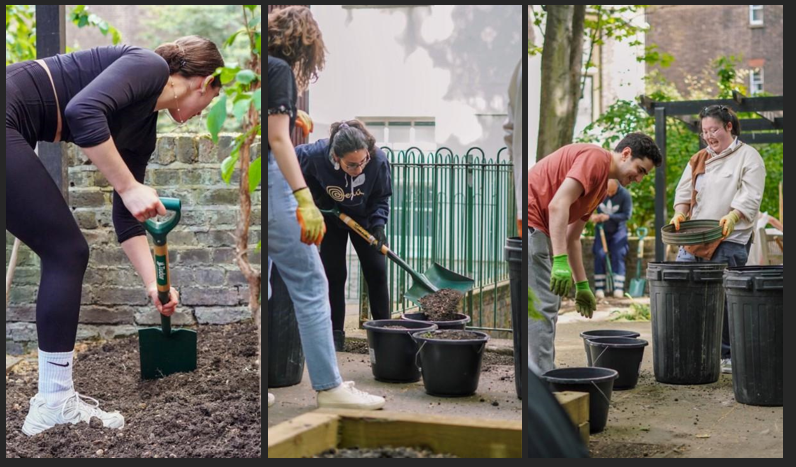
(1) Katherine is loosening and digging the soil with a spade. (2) Andrea is filling buckets. (3) Farid and Xiaoyu are separating the good soil from excess rubbles. Images Credit: Aude Vuilliomenet
Day 3— Enriching
A less strenuous day for this third afternoon of gardening. Most of the garden beds had been depleted from a few inches of soil and it was time to add some soil back into them. A human chain quickly took shape bringing the compost and manure bags to each of the garden beds. Now the fun could begin! In each bed, bags of compost made of decomposed plant materials such as grass, leaves, and table scraps, as well as bags of manure derived from faeces, urine and other droppings from animals, usually cows, horses, and chickens were added. The mix of both increases the nutrition of the soil, the water retention, and the water filtration ability of the soil. The only negative point is the pungent smell!
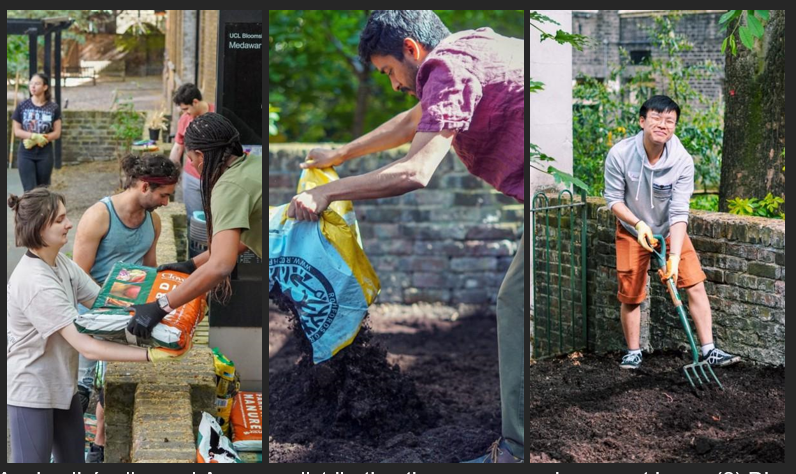
(1) Annia, Jhénelle, and Arun are distributing the manure and compost bags. (2) Dhruv is pouring compost into the beds. (3) Richard is stirring the soil together. Images Credit: Aude Vuilliomenet
Day 4— Planting
The birds seemed to be pleased with the new soil. Blackbirds and robins were hopping in the beds, pinching earthworms. Now, it was time to also make the plants happy. Arun had received the majority of the plants the day before and was working out the design. He was looking to balance the colours, the form of the leaves, and the texture of the plants: How to make this garden pleasant throughout the seasons? How to arrange the rosemary, sage, thyme and oregano? Where to plant the various roses? Which yarrow, ferns, and vetches to plant around them? There was a lot to think about. But after three days of hard work, a slower pace was welcome.
A few students started with the side beds, alternating Elephant Ears, Spotted Dead Nettles, Foxgloves and Cranesbills. Others were engaging with Arun on the central Acer bed, moving around Heucheras, Ferns and Vetches to test the look of various designs and settle on a final one. By the end of the day, it remains to water the newly planted plant, add ornamental bark and sweep the alley from dust. The garden was ready for the next day's opening event.
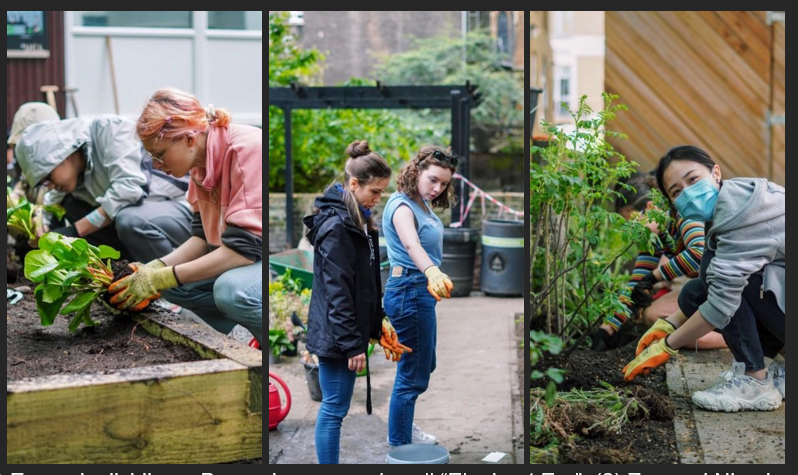
(1) Emma is dividing a Bergenia commonly call “Elephant Ear”. (2) Zoe and Niamh are discussing the planting design. (3) Ji is planting a small Yarrow. Images Credit: Aude Vuilliomenet
Project Feedback
The gardening sessions for Medawar Gardens were a success. Before the project started, Arun, Sarah and I were a bit worried about the engagement of students because this was the first time we were doing such an initiative together. Would enough students join us in this project? Would they like the manual and physical work? What about working in the dust and with soil?
A day after advertising the project, the number of people registering to attend the session kept growing. In four days, the majority of the sessions were fully booked, and in total, 60 students signed up, from undergraduate to PhD and also a few UCL Staff members. It was an encouraging start!
In order to understand the motivation and the experience of each participant across the project, a short feedback form was distributed at the end of the gardening sessions. Of a total of 45 participants, 23 filled out the form. The form asked a series of questions such as their access to a garden, participation in gardening activities, feeling before and after the gardening session, satisfaction and likelihood of future engagement. The results are striking!
A third of the respondents had never participated in gardening activities, with another third engaging less than twice a year. They came to the session for various reasons. Some wanted to learn a few basics (22%), so they could take better care of the patch of green in front of their house or in their students’ accommodation. Others were motivated to meet new people (17%). At equality was the motivation to do physical activity (30%) as well as taking a break from studying (30%).
While all respondents felt excited by the gardening sessions, not all had the same state of mind before the session. Many felt stressed by their work (65%), tired (57%), and with a foggy mind (35%). This changed after 2 to 4 hours of working outdoors on the Medawar Gardens project, surrounded by peers, and being physically active. Feeling of being stressed dropped two thirds (22%), being tired to almost half (30%), and almost all (91%) reported feeling energised and clearer in their mind. These results are only a snapshot of the many comments that we received verbally from the participants.
- “Such a thoughtful activity, loved it! :-)”
- “Really enjoyed the sessions. It is such a great project. We should be doing more of this on campus!”
- “Thank you for yesterday’s gardening session, I really enjoyed it! :-)”
- “It was lovely working on the garden, and you’ve inspired me to work more on my own little garden at home.:-)”
Positive feedback was also giving by Sustainable UCL, UCL Estates and the UCL Gardener.
Hannah Biggs, Sustainable UCL - “Medawar Gardens has been a fantastic project to work on. The garden has piloted an innovative way of doing landscaping on our campus, one where students and our gardeners are working together to keep the garden alive. The garden will provide a relaxing oasis for our students, as well as provide new habitats for species. I hope this model will be replicated elsewhere at UCL as our Wild Bloomsbury ambassadors continue to grow.”
Stan Balek, Tivoli Team – “I worked on many similar projects in the past, but this one was a really enjoyable to work on. UCl Wild Bloomsbury team is very passionate. It was also a real pleasure to coordinate with Arun for the gardening tasks. He has very good knowledge of gardening and a great drive to motivate all students. At Tivoli, we are looking forward to helping with the future maintenance of the garden.”

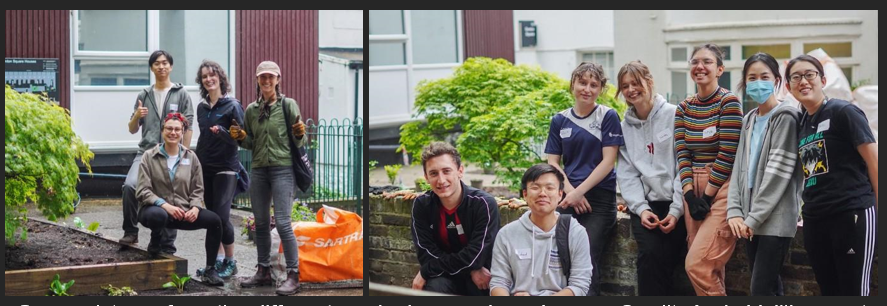
Group pictures from the different gardening sessions. Images Credit: Aude Vuilliomenet
Next Step
Medawar Gardens does not stop here. In the next months, the plants will grow, some may flower, and some may fade. But it will provide a sensory and relaxing space at the heart of UCL to take a break and learn about the smell of different plant species. A thriving garden requires only a few maintenance days throughout the year. Think of tasks such as pruning, trimming, weeding, and tidying. We look forward to organising a few maintenance sessions in the future and to continuing to bring students a little dose of nature while studying.
The regeneration of Medawar Gardens is, we hope, the beginning of other gardening and landscape architecture projects taken forward by UCL students and staff. The volunteers who took part will spread the word to their friends and we hope more people will come, visit, and enjoy the garden. We hope that this project will inspire world-renowned UCL faculties to come together and work on other green infrastructure projects on campus. To improve our climate resiliency and support biodiverse cities, landscape architects, engineers, ecologists, and social scientists will need to collaborate. It is a chance that this diversity of disciplines can be found at UCL within The Bartlett, Engineering Science, Life Science, Social & Historical Sciences faculties.
If you wish to take part in future projects, keep an eye on for a newly formed student’s association “The Bartlett Green Infrastructure Society” bringing gardening, landscape architecture, and urbanism together. And don’t forget in the meantime to check the events organised by Sustainable UCL and Wild Bloomsbury.
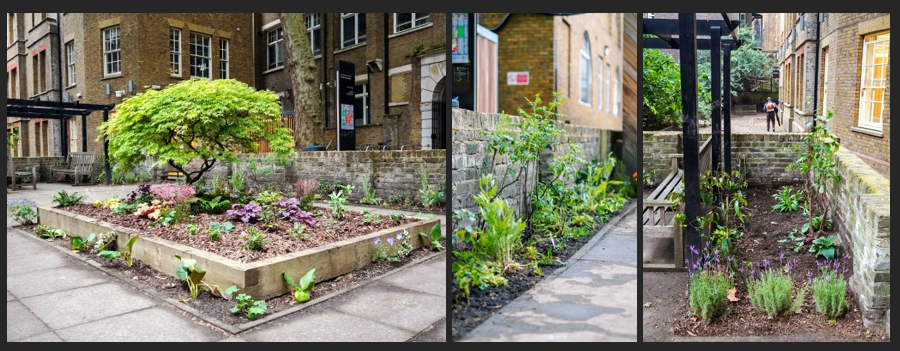
Medawar Gardens — After Gardening Sessions. Images Credit: Aude Vuilliomenet
Thanks for reading!
Aude, Arun and Sarah (UCL Wild Bloomsbury Ambassadors)
 Close
Close


